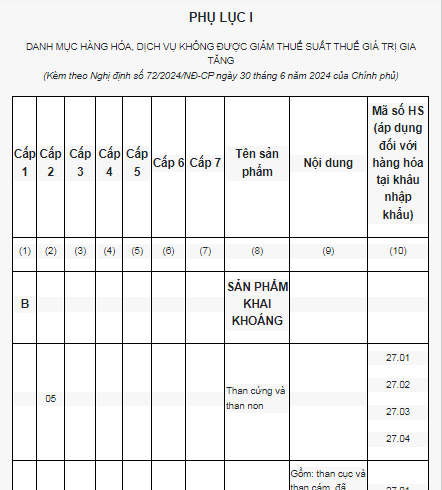What is the list of goods and services not eligible for VAT rate reduction in Vietnam in 2024?
What is the list of goods and services not eligible for VAT rate reduction in Vietnam in 2024?
Pursuant to Appendix 1, 2, 3 of the List of Goods and Services Not Eligible for Value-Added Tax Rate Reduction issued with Decree 72/2024/ND-CP, the list of goods and services not subject to the value-added tax rate reduction for 2024 is as follows:

Download the latest list of goods and services not eligible for the value-added tax rate reduction for 2024.
Note:
- The above list consists of goods and services not eligible for a reduction in value-added tax from 10% to 8%, so these goods remain at a VAT rate of 10%. Other items not on the list will be reduced from 10% to 8%.
- The Appendix of the List of Goods and Services not Eligible for VAT Reduction is part of the Appendix of the List and Content of the Vietnam Product Industry System issued with Decision 43/2018/QD-TTg dated November 1, 2018, by the Prime Minister of Vietnam on the issuance of the Vietnam Product Industry System.
- The HS codes in column (10) are for reference. Determining HS codes for actual imported goods is done according to the regulations on commodity classification under the Customs Law and guiding legal documents.
- Lines of goods marked with (*) in column (10) should declare the HS code according to the actual imported goods.

What is the list of goods and services not eligible for VAT rate reduction in Vietnam in 2024? (Image from the Internet)
Is a non-cash payment voucher required for VAT input tax deduction in Vietnam?
Based on Clause 2, Article 12 of the Value-Added Tax Law 2008 (amended by Clause 6, Article 1 of the Value-Added Tax Amendment Law 2013), the conditions for VAT input tax deduction are stipulated as follows:
- Have an invoice for the value-added tax on purchased goods and services, or a document evidencing payment of value-added tax for imported goods;
- Have a non-cash payment voucher for purchased goods and services, except for goods and services purchased in individual instances valued at less than twenty million VND;
- For exported goods and services, in addition to the conditions specified in point a and b of this clause, there must be: a contract signed with a foreign party for the sale or processing of goods and service provision; an export invoice; a non-cash payment voucher; a customs declaration for exported goods.
- Payment for exported goods and services through offsetting payment between exported and imported goods/services, or state debt substitutes, is considered non-cash payment.
Thus, according to these regulations, one of the conditions for VAT input tax deduction will require a non-cash payment voucher.
*Notice: Payment for exported goods and services in the form of offsetting payments between exported and imported goods/services, or substituting state debt is considered non-cash payment.
What are the duties of the tax authority in Vietnam?
Pursuant to Article 18 of the Tax Administration Law 2019, the duties of the tax authority are stipulated as follows:
- Organize and implement tax collection management and other state budget collections according to the provisions of tax law and other relevant legislative regulations.
- Propagate, disseminate, and guide tax law; publicly announce tax procedures at the headquarters, the electronic information portal of the tax authority, and in the mass media.
- Explain and provide information related to determining tax obligations to taxpayers; tax authorities are responsible for publicly stating the payable tax amount of business entities and individual businesses in communes, wards, and commune-level towns.
- Keep taxpayer information confidential, except for information provided to competent authorities or information disclosed according to the provisions of law.
- Implement tax exemptions; tax reductions; debt relief on tax, late payment interest, fines; exemption from late payment interest and fines; non-calculation of late payment interest; extension of tax payment; installment payment of tax debt; deferral of tax liabilities, tax non-collection; handling of overpaid tax, late payment interest, fines; tax refund according to this Law and other relevant legal provisions.
- Confirm the fulfillment of tax obligations by taxpayers upon request according to legal regulations.
- Resolve complaints and denunciations related to the observance of tax law within their jurisdiction.
- Deliver records, conclusions, and tax handling decisions after tax inspections and audits to taxpayers and provide explanations upon request.
- Compensate taxpayers for damage according to the legal provisions concerning state liability.
- Appraise to determine the tax liability amount of taxpayers upon the request of competent state agencies.
- Develop and organize an electronic information system and apply information technology to perform electronic transactions in the field of taxation.

